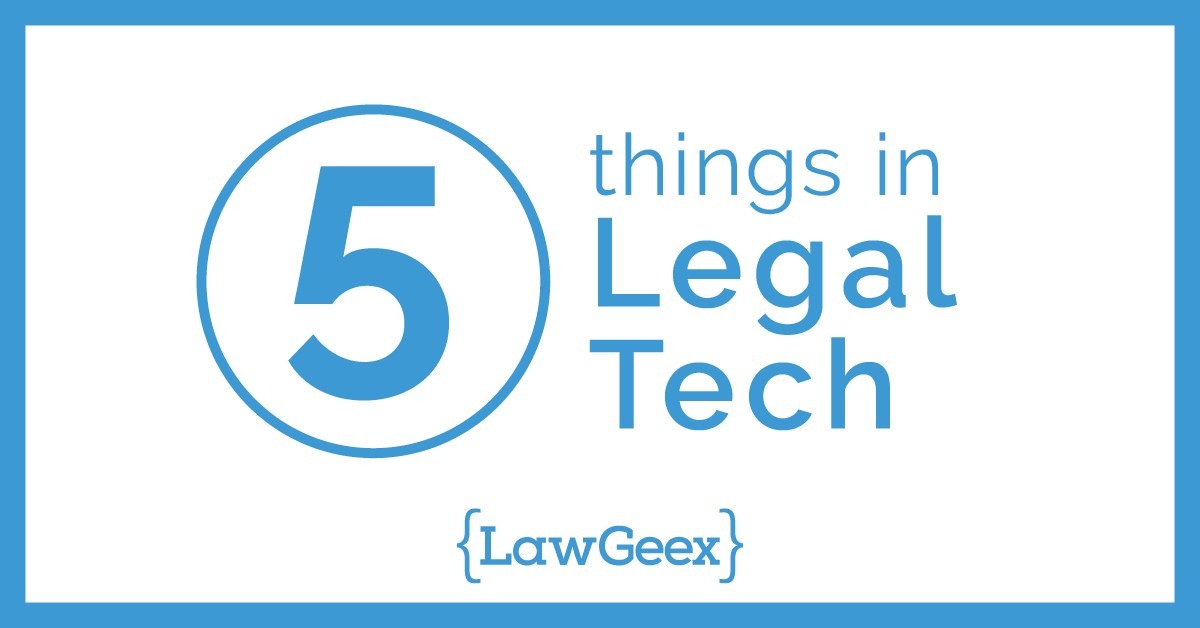Your time is short. This quick read gives you 5 things you need to know from LegalTech in the past seven days.
1
Diversity in Legal tech: more, please
Kristen Sonday of LegalTech startup, Paladin, released a report showing women and minority founders are underrepresented in legal technology. The figures show that only 13.6% of founders of LegalTech companies are women, and only 26.5% are people of color.
Carolyn Elefant, writing in Above the Law, says: “Though I’m troubled by the lack of diversity among legal tech startups, I’m also willing to give the industry a pass at least while it’s in its nascency.” She argues that legal technology helped her and countless women advance their legal careers after having children. She writes: “The advent of e-filing cut down the time involved in submitting court papers. Eventually, practice management systems and online billing enabled me to work seamlessly with a virtual assistant and remote contract lawyers.”
Other diversity success stories in LegalTech include Court Buddy, a legal-technology startup founded by James and Kristina Jones. Last week the site, which saves clients money on legal fees, scooped the People’s Pick for the law at the Webby Awards (the leading international award honoring excellence on the Internet), also attended by stars like David Letterman and Jesse Willaims. The Miami Herald has noted Court Buddy’s achievements: “Only 14 African-American women have raised $1 million or more in venture capital, and Kristina Jones of Miami-based Court Buddy is one of them.”
Our co-founders @KristinaBingham,@jjoneslaw and Head of client success @katiewhoelse recording our #5wordspeech for the #webby #awards in #NewYork!!
.
.#legaltech #funny #smile #court #courthouse #legal #attorneys #lawyers #webby #webbyawards #law #legal #entrepreneur #startup pic.twitter.com/jsrO0teDcb— LawChamps (@lawchamps) May 13, 2018
Read also: Women Of Legal tech On Disrupting A $600 Billion Profession
2
Explosion of Legal AI players
The number of legal technology AI companies has increased by 65% reports Artificial Lawyer. “This follows an explosion of well-funded legal technology startups alongside established players seizing new opportunities in the $700 billion legal market”. The findings come from the LawGeex Inhouse Counsel’s LegalTech Buyer’s Guide 2018, “providing lawyers and legal operations professionals with a broad range of data on legal tech”.
In the same week, Artificial Lawyer also reported an IQPC survey of 200 lawyers “suggesting that greater productivity (cited by 56% of participants) is the main driver for legal AI adoption and 58% of those surveyed say then plan to adopt AI solutions in the next year.
Read also: Jordan Furlong: Thinking differently about legal AI
3
Law firm Avengers: Innovation War
The law firm universe is uniting in innovation. Global law firm Reed Smith announced the roll-out of its 2018 “Innovation Hours” program, which recognizes up to 50 innovation hours toward billable-hour targets for fee earners. Meanwhile, in the same week, Norton Rose “rolled out ‘Parker’ the Legal Chat Bot for GDPR. Bryan Cave Leighton Paisner (BCLP) also announced the launch of Swiftagree which focuses on ensuring commercial terms reflect both parties’ intentions.
But the innovation may not be as widespread as first thought. Legal technology blogger Robert Ambrogi reports on the 2018 Aderant Business of Law and Legal Technology Survey. He writes that one clear finding is “although law firms often talk about innovation, fewer than a third have actually tasked someone within the firm with the responsibility for driving innovation.”
4.
Funding & performance
LinkSquares Inc., a Boston-based provider of AI-powered legal contract analytics, raised $2.16 million in a seed funding round. Notarize, a platform that allows for the remote notarization of documents online, announced it has raised $20 million.
Meanwhile, Thomson Reuters (behind Westlaw) reported that its legal business reported revenue of $872 million in the first quarter, up 2 percent. The company said this represents the best performance of this business since the first quarter of 2016. James Smith, CEO of Reuters, says: “I don’t think there has been any sea change when you think about law firms. In fact, overall law firm demand was slightly down in the first quarter. The demand for legal services. We’ve seen the same dynamics at the bigger firms doing better, small and medium firms having a tougher time, so there’s not been a change in those dynamics.”
5.
Insurance tech rewrites legal
Insurance tech (Insurtech for short) has decided to do its bit for legal innovation, and legalese in particular.
Lemonade is a tech company disrupting the insurance industry (Aleph VC, which invests in Lemonade, also invests in LawGeex). This week, TechCrunch reported that while Lemonade is succeeding in disrupting insurance, they remain held to long, tedious legalese in their insurance contracts. The tech site reports: “In Lemonade’s case, the document is more than 40 pages long and incredibly difficult to understand. For a company that wants to make buying insurance as easy and as consumer-centric as possible, the very product they sell is in complete opposition to that. Which is why Lemonade is re-writing the policy from scratch.”
But, in a twist, Lemonade is open-sourcing the policy on GitHub. Anyone, from state regulators to consumer advocacy groups to Lemonade competitors or even interested customers can make edits and contributions to the policy.
- The legal tech market size and growth in the past year
- The definitive step-by-step guide on how to buy legal tech from Lucy Bassli, former Assistant General Counsel at Microsoft
- First person accounts of legal tech buying by leading legal department leaders at the world’s top companies, including Facebook, Google, NetApp, McDonald’s, AIG, Twitter and many more
- 130+ top technology solutions for legal departments
- Explanations of an in-house legal tech buying journey, including barriers to adoption, establishing and monitoring KPIs, and more





